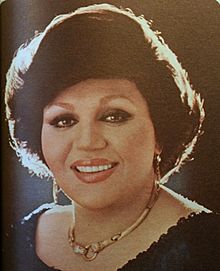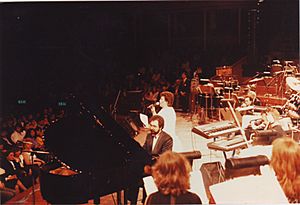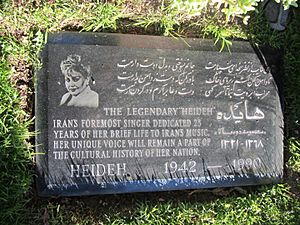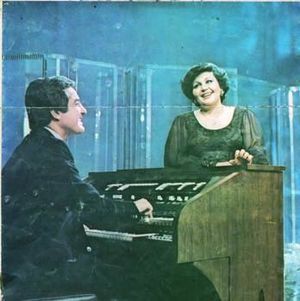Hayedeh facts for kids
Quick facts for kids
Hayedeh
|
|
|---|---|

Hayedeh in 1977
|
|
| Background information | |
| Birth name | Ma'soumeh Dadehbala |
| Born | 10 April 1942 Tehran, Iran |
| Died | 20 January 1990 (aged 47) San Francisco, California, United States |
| Genres |
|
| Occupation(s) | Singer |
| Years active | 1967–1990 |
| Associated acts | Mahasti |
Ma'soumeh Dadehbala (Persian: معصومه ددهبالا; born April 10, 1942 – died January 20, 1990), known as Hayedeh (Persian: هایده), was a famous Iranian singer. She sang both classical and pop songs. Hayedeh was known for her amazing voice, which had a wide range. She sang for over 20 years and is still one of the most popular singers from Iran.
Contents
Hayedeh's Early Life and Music Career
Ma'soumeh Dadehbala was born in Tehran, Iran, on April 10, 1942. She was the older sister of another famous singer named Mahasti.
Hayedeh started her singing career in 1968. She joined a traditional Persian music show on Radio Tehran called "Golhâye Rangârang" (which means "Colorful Flowers"). This show was led by Davoud Pirnia.
Hayedeh learned a special type of Persian singing called Avaz. Her teacher was the famous Persian violinist and composer Ali Tajvidi.
Her first official song was "Azadeh" in 1968. Ali Tajvidi composed the music, and Rahi Moayeri wrote the words. Hayedeh performed it with the Gol-ha Orchestra on Radio Tehran. In the same year, she also released another song called Raftam.
In the 1970s, Hayedeh started singing Persian pop music in addition to her classical songs. During this time, she worked with many talented songwriters. Some of them were Fereydoun Khoshnoud, Jahanbakhsh Pazouki, Anoushiravan Rohani, and Mohammad Heydari. Some of her popular songs from this period include "Bezan Tar," "Gol-e Sang," "Nowrouz Aamad," and "Soghati."
Life After the Revolution

In 1978, just before the Islamic Revolution in Iran, Hayedeh moved to the United Kingdom. She lived there for three years. Then, in 1982, she moved to the United States to continue her music career.
Hayedeh lived in Los Angeles, California, from 1982 until she passed away. Many Iranians moved to Southern California after the revolution. This growing Iranian community helped Hayedeh's career become even more successful in the 1980s.
She released many popular albums during this time. Even though her songs were not officially sold in Iran, many people there still found ways to listen to them. Hayedeh's songs often talked about politics or memories of home. Songs like "Rouzaye Roshan," "Ghesseyeh Man," and "Zendegi" became very popular with Iranians living outside their home country.
In the United States, she worked with composers and producers like Sadegh Nojouki, Mohammad Heydari, and Andranik. She also collaborated with songwriters such as Ardalan Sarfaraz, Homa Mir-Afshar, and Bijan Samandar. Her close friend, Leila Kasra (also known as Hedieh), wrote more than 30 of Hayedeh's hit songs. Leila Kasra's poems were often featured on Hayedeh's albums. While living outside Iran, Hayedeh often appeared on Persian TV channels in Los Angeles, like IR TV and Jaam-E-Jam.
Her Passing and Burial

On January 20, 1990, Hayedeh passed away from a heart attack. This happened just a few hours after she performed at the Casablanca Club in San Francisco, California. She was 47 years old. She had been dealing with diabetes and hypertension (high blood pressure).
Hayedeh was buried on January 24, 1990, at the Westwood Village Memorial Park Cemetery in Los Angeles, California. She was working on a new album before she died and planned to finish it after her concert in San Francisco.
Hayedeh's Legacy
Hayedeh's albums are still very popular today. Her songs are played on Persian TV and radio channels outside Iran. Many Iranian pop singers perform her songs. For example, Houshmand Aghili sang Hayedeh's "Sarab," and Parviz Rahman Panah remixed her song "Saal." Singer Amir covered Hayedeh's "Soghati" in 2008. Her sister, Mahasti, also sang three songs to remember Hayedeh.
Professor Erik Nakhjavani, a scholar, said that Hayedeh sang with great skill and strong emotion. He noted that she could control her voice very well, moving smoothly from high notes to lower, deeper ones. This mix of strength and vocal technique gave her voice a unique and powerful sound. She also had a great sense of timing and could express the feelings of the songs and poems she sang.
An Iranian pianist and journalist named Pejman Akbarzadeh made a documentary film about Hayedeh. It is called Hayedeh: Legendary Persian Diva. The film was first shown in Amsterdam in January 2009. It also premiered in the US in May 2009 at the Noor Iranian Film Festival in Los Angeles, where it was nominated for Best Documentary. The film was also shown at other festivals in Sweden and the Netherlands. The documentary was released on DVD on January 20, 2010, which was 20 years after Hayedeh's death.
Partial Discography
Studio Albums
- Azadeh (1968)
- Raftam (1968)
- Nasepasi (1969)
- Afsaneh Shirin (1970) – with Shajarian
- Yaarab (1982)
- Hamkhooneh (1984) – with Viguen
- Shabeh Eshgh (1985)
- Shanehayat (1986)
- Sogand (1988)
- Safar (1988) – with Moein
- Ey Zendegi Salaam (1989)
- Golhayeh Ghorbat (1990) – with Moein
- Bezan Taar (1991)
- Kharabati (1991)
- Golvaazheh (1991)
- Khoda Hafez (1991)
- Paadeshahe Khoobaan (1992)
- Roozaayeh Roshan (1992)
- Shabeh Asheghan – with Sattar
- Naa Shanidehaa
- Faryad
- Bolboli Ke Khaamosh Shod
- Aamadanet Mahaaleh
- Owje Sedaa
- Mehmaan
- Hayf
- Taranehyeh Saal
Compilation Albums
- Best of Hayedeh
- 40 Golden Hits of Hayedeh
- 40 Hayedeh Golden Songs, Vol I
- Hayedeh Golden Songs, Vol II
- Shirin Jaan, Hayedeh 4
- Dashtestani, Hayedeh 5
- Afsaneh Shirin, Hayedeh 8
Images for kids
See also
 In Spanish: Hayedeh para niños
In Spanish: Hayedeh para niños



